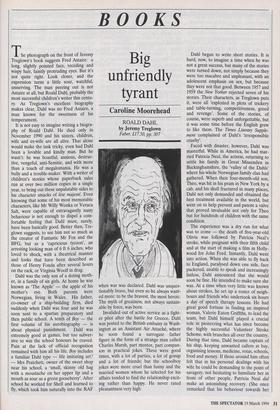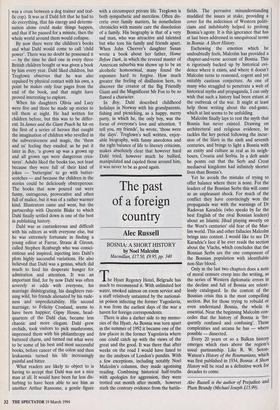BOOKS
Big unfriendly tyrant
Caroline Moorehead
ROALD DAHL by Jeremy Treglown Faber, L17.50, pp. 307 The photograph on the front of Jeremy Treglown's book suggests Fred Astaire: a long, slightly pointed face, receding and wispy hair, faintly protruding eyes. But it's not quite right. Look closer, and the expression turns a little sour, watchful, unnerving. The man peering out is not Astaire at all, but Roald Dahl, probably the most successful children's writer this centu- ry. As Treglown's excellent biography makes clear, Dahl was no Fred Astaire, a man known for the sweetness of his temperament.
It is not easy to imagine writing a biogra- phy of Roald Dahl. He died only in November 1990 and his sisters, children, wife and ex-wife are all alive. That alone would make the task tricky, even had Dahl been a lovable and kindly man. But he wasn't: he was boastful, anxious, destruc- tive, vengeful, anti-Semitic, and with more than a touch of megalomania. He was a bully and a trouble-maker. With a writer of children's stories whose paperback sales run at over two million copies in a single year, to bring out these unpalatable sides to his character smacks of lease majeste. Even knowing that some of his most memorable characters, like Mr Willy Wonka or Veruca Salt, were capable of extravagantly nasty behaviour is not enough to dispel a com- fortable feeling that Dahl must, surely, have been basically good. Better then, Tre- glown suggests, to see him not so much as the creator of Fantastic Mr Fox and the BFG, but as a 'capricious tycoon', an arresting looking man of 6 ft 6 inches, who loved to shock, with a theatrical manner and looks that have been described as those of Henry Fonda after several hours on the rack, or Virginia Woolf in drag. Dahl was the only son of a doting moth- er, in a family of six girls. At home he was known as 'The Apple' — the apple of his mother's eye. Both parents were Norwegian, living in Wales. His father, co-owner of a ship-building firm, died suddenly when Dahl was four and he was soon sent to a spartan preparatory and then public school. A tenth of Boy — the first volume of his autobiography — is about physical punishment. Dahl was extremely good at games, but too subver- sive to win the school honours he craved. Pain at the lack of official recognition remained with him all his life. Boy includes a familiar Dahl type — life imitating art? — Mrs Pratchett, owner of the sweet shop near his school, a 'small, skinny old hag with a moustache on her upper lip and a mouth as sour as a green gooseberry'. After school he worked for Shell and learned to fly, which took him naturally into the RAF when war was declared. Dahl was unques- tionably brave, but even so he always want- ed more: to be the bravest, the most heroic. The myth of greatness, not always sustain- able by force, was born.
Invalided out of active service as a fight- er pilot after the battle for Greece, Dahl was posted to the British embassy in Wash- ington as an Assistant Air Attaché, where he soon found a surrogate father figure in the form of a strange man called Charles Marsh, part mentor, part compan- ion in practical jokes. These were good times, with a lot of parties, a lot of gossip and a lot of friends; but the schoolboy jokes were more cruel than funny and the married women whom he selected for his affairs tended to find the relationship excit- ing rather than happy. He never rated pleasantness very high. Dahl began to write short stories. It is hard, now, to imagine a time when he was not a great success, but many of the stories were turned down, not simply because they were too macabre and unpleasant, with an adolescent emphasis on sex, but because they were not that good. Between 1957 and 1959 the New Yorker rejected seven of his stories. Their characters, as Treglown puts it, were all 'exploited in plots of trickery and table-turning, competitiveness, greed and revenge'. Some of the stories, of course, were superb and unforgettable, but it was some time before the English grew to like them. The Times Literary Supple- ment complained of Dahl's 'irresponsible cruelty'.
Faced with disaster, however, Dahl was masterful. While in America, he had mar- ried Patricia Neal, the actress, returning to settle his family in Great Missenden in Buckinghamshire, the 'valley of the Dahls' where his whole Norwegian family clan had gathered. When their four-month-old son, Theo, was hit in his pram in New York by a cab, and his skull fractured in many places, Dahl not only demanded and obtained the best treatment available in the world, but went on to help prevent and patent a valve that proved invaluable not only for Theo but for hundreds of children with the same condition.
The experience was a dry run for what was to come — the death of five-year-old Olivia was followed by Patricia Neal's stroke, while pregnant with their fifth child and at the start of making a film in Holly- wood for John Ford. Instantly, Dahl went into action. When she was able to fly back to England, paralysed down one side, face puckered, unable to speak and increasingly listless, Dahl announced that she would soon be fine. He intended to make sure she was. At a time when very little was known about strokes, he set up a roster of neigh- bours and friends who undertook six hours a day of speech therapy lessons. He had great good fortune in finding an inspired woman, Valerie Eaton Griffths, to lead the team, but Dahl himself played a crucial role in pioneering what has since become the highly successful Volunteer Stroke Scheme, with branches all over the country. During that time, Dahl became captain of his ship, keeping unwanted callers at bay, organising lessons, medicine, rotas, schools, food and money. If those around him often felt that in his personal dealings with his wife he could be demanding to the point of savagery, not hesitating to humiliate her in front of other people, Patricia Neal did make an astonishing recovery. (She once remarked that his behaviour towards her was a cross between a dog trainer and traf- fic cop). It was as if Dahl felt that he had to do everything, that his energy and determi- nation alone could make things happen, and that if he paused for a minute, then the whole world around them would collapse.
By now there were the children's books and what Dahl would come to call 'child power'. There was no doubt he possessed it — by the time he died one in every three British children bought or was given a book by him every year. Dahl liked children, but Treglown observes that he was also repulsed by physical contact with his own, a point he makes only four pages from the end of the book, and that might have proved interesting to explore.
When his daughters Olivia and Lucy were five and three he made up stories to tell them at night. He had written for children before, but this was to be differ- ent. In James and the Giant Peach he hit on the first of a series of heroes that caught the imagination of children who revelled in the subversiveness and magic, the 'them and us' feeling they exuded: as he put it later in Boy, 'a grown up was a grown up and all grown ups were dangerous crea- tures'. Adults liked the books too, not least because they were full of their kind of jokes — `buttergins' to go with butter- scotches — and because the children in the stories could be deliciously obstreperous. The books that now poured out were funny, outrageous, provocative and often full of malice, but it was of a rather warmer kind. Illustrators came and went, but the partnership with Quentin Blake to which Dahl finally settled down is one of the best in publishing history.
Dahl was as cantankerous and difficult with his editors as with everyone else, but he was extremely fortunate in finding a young editor at Farrar, Straus & Giroux, called Stephen Roxburgh who was consci- entious and inspired, injecting into Dahl's plots highly successful variations. He also believed that Dahl was a genius, which did much to feed his desperate hunger for admiration and attention. It was an important find, for by now Dahl was often severely at odds with everyone, his marriage disintegrating, his daughters run- ning wild, his friends alienated by his rude- ness and unpredictability. His second marriage, to Felicity Crosland, seems to have been happier; Gipsy House, head- quarters of the Dahl clan, became less chaotic and more elegant. Dahl grew orchids, took visitors to pick mushrooms, impressed them with his philanthropy and battered charm, and turned out what were to be some of his best and most successful books, before cancer of the colon and then leukaemia turned his life increasingly painful and bitter.
What readers are likely to object to is having to accept that Dahl was not a nice man at all. It would have been far less dis- turbing to have been able to see him as another Arthur Ransome, a gentle figure with a circumspect private life. Treglown is both sympathetic and merciless. Often dis- crete over family matters, he nonetheless chronicles with minute care the dissolution of a family. His biography is that of a very sad man, who was attractive and talented but who tore his family and friends apart. When John Cheever's daughter Susan wrote a book about her father, Home Before Dark, in which the revered master of American suburbia was shown up to be an alcoholic homosexual, many found the exposure hard to forgive. How much greater the feeling of disillusion here, to discover the creator of the Big Friendly Giant and the Magnificent Mr Fox to be so flawed a character.
In Boy, Dahl described childhood holidays in Norway with his grandparents, fishing and picnicking, as a happy, merry party, in which he, the only boy, was the focus of everyone's love and attention. 'I tell you, my friends', he wrote, 'those were the days'. Treglown's well written, enjoy- able biography, with funny anecdotes and the right balance of life to literary criticism, makes absolutely clear that however hard Dahl tried, however much he bullied, manipulated and cajoled those around him, it was never to be as good again.



























































 Previous page
Previous page